new posts in all blogs
Viewing: Blog Posts Tagged with: dream journaling, Most Recent at Top [Help]
Results 1 - 15 of 15
How to use this Page
You are viewing the most recent posts tagged with the words: dream journaling in the JacketFlap blog reader. What is a tag? Think of a tag as a keyword or category label. Tags can both help you find posts on JacketFlap.com as well as provide an easy way for you to "remember" and classify posts for later recall. Try adding a tag yourself by clicking "Add a tag" below a post's header. Scroll down through the list of Recent Posts in the left column and click on a post title that sounds interesting. You can view all posts from a specific blog by clicking the Blog name in the right column, or you can click a 'More Posts from this Blog' link in any individual post.
By: frankramer,
on 11/19/2014
Blog:
(
Login to Add to MyJacketFlap)
JacketFlap tags:
dreams,
Uncategorized,
dream,
dream journal,
dreamwork,
healing dreams,
dream journaling,
working with dreams,
On Dreams,
benefits of remembering dreams,
Dreamwork Methods,
dream healing,
evaluating dreamwork,
lucid dream,
progress in dreamwork,
Add a tag
When my students do dreamwork (the recording and working with dreams to learn something from the dreams) on a regular basis, what I sometimes get asked is this: How do I know I am making progress in working with dreams?
This is a good question, because unless I am working with someone who knows a lot about dreamwork such as a dream mentor, the answers may not be all that apparent, especially in the beginning. However, in the long run, progress will definitely become more obvious because of the positive changes the dreamer will see in his or life.
Indicators of progress in dreamwork can be seen in the following:
- Dreams become more vivid and easier to remember. A beginner usually has difficulty remembering dreams. Just having the intention to remember dreams will often prompt the dreamer to remember his or her dreams. Need help in remembering dreams? See Tried and True Tips to Better Remember Your Dreams at http://wp.me/p45aiq-5B
- Dreams seem to “come” when one needs or wants them. Just making the intention to do regular dreamwork or participate in a dream class will often encourage the psyche to offer the dreamer a sudden outpouring of dreams.
- Discovering that dreams do respond to requests for information and wisdom with appropriate insights. Asking for a particular dream (Dream Incubation) and getting a helpful answer is truly empowering for the neophyte starting the study of dreams. It’s like meeting a powerful helper for the first time. This experience gives the dreamer confidence to ask for more help from dreams. For information on incubating a dream see Ask and You Shall Receive: Incubating a #Dream at http://wp.me/p45aiq-71
- Experiencing a lucid dream. A lucid dream is one in which the dreamer feels like he or she is awake and aware in the dream, all the while knowing it is a dream. Conscious choices can be made within the dream. One feels one can create the dream. Like dream incubation, this is an empowering to the dreamer. Lucid dreams can be also be requested for or intended in order to heal, problem solve or gain information.
- Experiencing healing, a solution or guidance in a dream or through information received in a dream.
- Discovering and evaluating what contributions dreams have made. After recording dreams for a significant period of time, one can go back and review dreams to find how they related to events and experiences in waking life during that time. This can be an eye-opening experience of discovery when one sees that many dreams do come true, show the processes and transformations one is going through in life, and support and nurture the dreamer from a deeper source.


By: frankramer,
on 11/12/2014
Blog:
(
Login to Add to MyJacketFlap)
JacketFlap tags:
dreams,
Uncategorized,
dream,
soul,
dream journal,
dreamwork,
dream journaling,
working with dreams,
benefits of remembering dreams,
Dreamwork Methods,
Polls on Intuition,
Dreams and visions,
Lissa Rankin,
loss of soul,
role of dreams in spirituality,
soul in dreams,
soul loss,
Add a tag
Do you feel out of touch with yourself? Do you feel that your culture is shallow and vapid? You are not alone. In 20 Diagnostic Signs That You’re Suffering From “Soul Loss,” Lissa Rankin, M.D., states that this is a very common malady in today’s world. She says not only individuals suffer from this but so do cultures. In my opinion, religions, and in particular, churches can also suffer from it. Whenever we, whether individually or collectively, have lost sight of what animates us, what makes us come alive or what drives us, we suffer from a form of soul loss.
Dreams and holding on to a dream are some keys to recover the soul’s enlivening power in our waking life. Dreams come from the soul itself and speak for the soul and its needs. It is no wonder that so many individuals suffer soul loss when they don’t value their dreams and don’t make an effort to remember them or work with them. Institutions lose soul when they lose sight of the founder’s vision or dream for that organization. This is particularly true of religions and churches which become social clubs or babysitting stations for kids when the ties to a deep spiritual connection have been broken or not promoted among the followers.
Therefore, a remedy for recovering from soul loss is studying about dreams, learning both how to work with them and learning from them:
Individually, this means keeping a dream journal and doing dreamwork on an on-going and consistent basis.
Collectively, this means studying and learning from the dreams and visions of the founders. Institutions can recapture their original dynamism by going back to the basics, to be once again inspired by the founders, learning what defined the organization and why it was started in the first place.
Dreams and visions are all about purposes of soul and how soul presents itself in the world. What is your true dream? In that you will find your true inspiration.


By: frankramer,
on 10/28/2014
Blog:
(
Login to Add to MyJacketFlap)
JacketFlap tags:
Uncategorized,
dream,
insight,
dream journal,
recording dreams,
intuitive insight,
dreamwork,
dream journaling,
working with dreams,
On Dreams,
benefits of remembering dreams,
Dreamwork Methods,
insights from dreams,
Add a tag
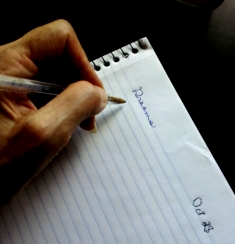
Recording Dreams
Dreamwork is the practice of regularly recording and reflecting on one’s dream in a conscious and applied manner with the intention to learn from the wisdom of dreams. It is not an easy task. In fact, it is probably one of the most challenging projects a person could take on, and yet, possibly one of the most rewarding.
Freud said dreams were “the royal road to the Unconscious.” Connecting to dreams is a direct method to connect to the Unconscious, the deepest part of you. So if you want to really get to know yourself through and through, doing dreamwork is one of the best ways to do it.
By committing to dreamwork, you are giving permission to the Unconscious to inform your waking life, bringing new and often challenging insights into a consciousness that is often protected from this greater reality by a tough Ego that wants to be safe, secure and in control. Often, the interests of Ego and the interests of Unconscious are at odds. This means:
- You may experience conflicting values in situations where your ego has learned to adapt, appease, turn a blind eye or, conversely, be overly critical and your Unconscious is suggesting a bolder, risky or more loving response.
- You may be presented with information about a situation you would rather not know. Dreams often can see the bigger picture and give information you do not pick up in waking consciousness or they may portend events in the future that may be hard to accept.
- Dreams may show you how powerful you can be if you forgo your fears and act on your dreams. Dreams may show you doing things in dreamtime you are frightened to do in your waking life—but in dreamtime accomplish with ease, grace and sometimes with the help of angelic beings. This is why the phrase “If you can dream it, you can do it” is so true. It’s like the holographic prototype model has already been tested in dreamtime, proving to you it can work.
By committing to dreamwork, then, you are committing yourself to be open to another level of awareness that calls you to move beyond the constraints of Ego limitations and into a world of limitless possibilities. What can be more exciting than that?


By: frankramer,
on 10/22/2014
Blog:
(
Login to Add to MyJacketFlap)
JacketFlap tags:
dreams,
Uncategorized,
dream,
dream journal,
dreamwork,
dream journaling,
On Dreams,
prophetic dreams,
benefits of remembering dreams,
Dreamwork Methods,
foreknowledge,
dream information,
Hippocrates,
manifesting dreams,
surrealistic,
Add a tag

Hippocrates of Kos taught about dreams indicating illnesses.
If you faithfully keep a dream journal you will notice, over time, many things and events that you dream about come true in waking life. It may be the sequence of events that particularly manifest or it may be that you see a person in dreamtime you never met before–but several months after the dream you meet that person in waking life. Then there are some dreams that don’t appear to have any relationship to current reality or seem so bizarre and surrealistic that it doesn’t seem they could ever be making a true statement about anything.
This raises the question of how do you know if a dream might manifest in waking life? From nearly forty years of dreamwork, I have made these observations about my own dreams. You might see if they apply to your own.
- Very realistic dreams tend to manifest in waking life. If I have a dream that is realistic and probable, i.e., I am driving my own car and not some fantasy car, then it probably has something to do with manifesting something in waking life. For example, any physical ailment which I knew about ahead of time in dreamtime presented quite literally and showed up later on a medical test as when years ago I had a dream in which a voice said I had blood in my stool. A medical test actually concurred with that even though a later colonoscopy proved it was nothing to worry about. This rule applies also in cases where the symbolism is present but there is a clear resemblance such as dreaming of having overflowing pipes and end up having diarrhea. This is possible because there is a close proximity to the symbol and waking reality. In fact, Hippocrates, the father of modern medicine, said much medical and diagnostic information of this sort could be gained from similar dreams.
- Somewhat surrealistic or unrealistic events may be relating events in the far off future. Years ago I had a series of dreams in which I was traveling around Hawaii with my brother. At the time I was living in Massachusetts, and so the possibility of this happening seemed a little far-fetched. The island’s scenery was stylized in my dream, not being typical of a specific place on any of the islands. Yet, as I read my dream journal years later, I found that after I moved to Hawaii, we did travel around the island of Oahu as we did in the dream, and we shared certain concerns that showed up in those early dreams.
- Very surrealistic dreams tend to be making a statement about the interior world of the dreamer. Really bizarre, odd or unusual objects in places they don’t usually belong, such as a rare or extinct species of owl in a refrigerator, are most often aspects of the dreamer and need to be looked at as such by asking, “What about me is like this owl?” or “What about me is like the refrigerator?” In this type of dream, I personally have not seen a close or frequent connection to events or objects manifesting in waking life such as opening the refrigerator and finding a rare spotted owl perched next to the orange juice.


By: frankramer,
on 9/12/2014
Blog:
(
Login to Add to MyJacketFlap)
JacketFlap tags:
Uncategorized,
teenagers,
teen,
dream,
Massachusetts,
intuition,
teen mystery,
intuitive,
young adult mystery,
Gloucester,
Ashlynn Acosta,
Dead Men Do Tell Tales,
healing dreams,
dream journaling,
On Intuition,
benefits of remembering dreams,
Dreamwork Methods,
Too Much of a Good Thing,
Ashlynn,
Add a tag
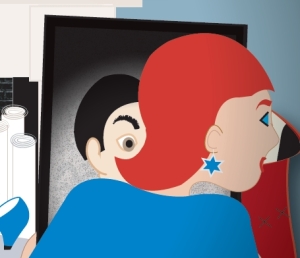
A Lady Desires a Painting
Artwork by Christine Soltys
For the many who have asked, Ashlynn Acosta will be making her second appearance as the intuitive teen sleuth in Too Much of a Good Thing, a young adult mystery novel set in Gloucester, Massachusetts. In the intriguing story, our heroine deals with issues of hoarding, ownership, greed and possessiveness that lead to a crime.
The problematic relationship with her single dad, a “just the facts” police detective, has healed through the challenges met and shared in Dead Men Do Tell Tales. Relishing this lively new connection with her dad, Ashlynn suspects any woman seriously claiming her father’s attention. When a beautiful redhead enters the scene, Ashlynn faces the need to solve a mystery in the midst of a budding romance between her father and this most surprising lady. Pressure builds when her buddy group divides into romantic couples and she is paired with a guy who evokes new feelings in her! She is overwhelmed by it all.
Ashlynn’s very first date takes place as she tries to uncover the real mystery in the midst of too much of too many good things. Intuition and real dreamwork are the tools Ashlynn uses to help her understand and act on her new feelings as well as unravel the secrets in a mansion on a hill where a rich old lady has been found dead.
In a Reader’s Guide at the end of the novel, you can learn more about the intuitive tools Ashlynn uses and learn how they can be employed to unlock your own mysteries and solve your own problems.


By: frankramer,
on 9/12/2014
Blog:
(
Login to Add to MyJacketFlap)
JacketFlap tags:
Uncategorized,
teenagers,
teen,
dream,
Massachusetts,
intuition,
teen mystery,
intuitive,
young adult mystery,
Gloucester,
Ashlynn Acosta,
Dead Men Do Tell Tales,
healing dreams,
dream journaling,
On Intuition,
benefits of remembering dreams,
Dreamwork Methods,
Too Much of a Good Thing,
Ashlynn,
Add a tag

A Lady Desires a Painting
Artwork by Christine Soltys
For the many who have asked, Ashlynn Acosta will be making her second appearance as the intuitive teen sleuth in Too Much of a Good Thing, a young adult mystery novel set in Gloucester, Massachusetts. In the intriguing story, our heroine deals with issues of hoarding, ownership, greed and possessiveness that lead to a crime.
The problematic relationship with her single dad, a “just the facts” police detective, has healed through the challenges met and shared in Dead Men Do Tell Tales. Relishing this lively new connection with her dad, Ashlynn suspects any woman seriously claiming her father’s attention. When a beautiful redhead enters the scene, Ashlynn faces the need to solve a mystery in the midst of a budding romance between her father and this most surprising lady. Pressure builds when her buddy group divides into romantic couples and she is paired with a guy who evokes new feelings in her! She is overwhelmed by it all.
Ashlynn’s very first date takes place as she tries to uncover the real mystery in the midst of too much of too many good things. Intuition and real dreamwork are the tools Ashlynn uses to help her understand and act on her new feelings as well as unravel the secrets in a mansion on a hill where a rich old lady has been found dead.
In a Reader’s Guide at the end of the novel, you can learn more about the intuitive tools Ashlynn uses and learn how they can be employed to unlock your own mysteries and solve your own problems.


By: frankramer,
on 9/10/2014
Blog:
(
Login to Add to MyJacketFlap)
JacketFlap tags:
Edgar Cayce,
dream journaling,
working with dreams,
Déjà vu,
On Dreams,
benefits of remembering dreams,
Dreamwork Methods,
dreamtime,
foreknowledge,
waking reality,
You only live twice,
dreams,
Uncategorized,
dream,
foreshadowing,
experience,
Add a tag

Déjà vu: How could I be here before?
, the experience of already having seen something or visited someplace, is a common experience that modern science cannot explain. For example, I might be traveling in a foreign country, visiting a famous place like the Great Wall of China for the first time. All of sudden I get the feeling I have been here and this place is familiar.
After nearly forty years of recording my dreams, and having so many dreams of being in strange places and meeting new people that become manifest in waking life, I am almost convinced déjà vu is an experience of remembering something or someplace previously seen in dreamtime, and the memory surfaces from the long-forgotten, or possibly never-remembered dream when waking reality mimics the earlier experience in dreamtime. I was first made aware of this dual reality when I was in college and had a dream just after my roommate became engaged.
Dream:
I dream of attending my college roommate’s wedding in a white church I didn’t recognize in waking life. The dream is vivid and clear in every detail, especially the completely white color of church exterior, the unusual reddish brown design inside the church and the fact that I am taken to the church in the groom’s parents’ white car, sitting in the right rear seat.
On waking I completely forgot about the dream because I wasn’t in the habit of recording my dreams at this stage of my life. When the day of the wedding arrived approximately six months later, and we were about to go to the church, I was told to ride in the groom’s parents’ white car. As I looked at the car, I suddenly I recalled the dream and remembered I had seen this before, been here and done this! I got goose bumps. Reality then played out according to my dream. I was told to sit in the right backseat, exactly where I was in the dream. On the way to the church I suspected the church would be all white on the outside and inside would have that unusual reddish brown design. And sure enough, it did.
Déjà vu suggests a Similar Dreamtime and Waking Reality
Edgar Cayce and others have stated that in dreamtime we get a foreshadowing of all the important events in our life before they become manifest in waking life. It is in dreamtime where we make choices that may eventually play out in waking time because dreamtime puts us into the future to prepare the way for us. That is one reason why Casey is quoted as saying “Dreams are today’s answers to tomorrow’s questions.” It’s like we are given a trial run. If we are dream-aware, we can make use of this test case scenario. If not, it’s as if we are programmed to follow through with the same decision in waking life as we made in dreamtime.
Living Twice in this Life
This concept of living our life twice, in dreamtime and waking time, is hinted at in popular culture with the James Bond theme song sung by Nancy Sinatra,
“You only live twice or so it seems
One life for yourself and one for your dreams.”
While some may interpret this to mean we live two different lives, one in our dreams (perhaps daydreams) and one in waking life, and these realities might not necessarily match in quality or enjoyment, my experience indicates that night dreams pretty well do match waking life—unless I consciously NOT make a decision I made in dreamtime because I didn’t like the outcome I saw in the dream. However, this type of decision-making requires knowing what was dreamed about and remembering it, perhaps many years after the dream! To me, this is what is meant by getting answers about the future from the dream. If you liked the outcome of your choice in dreamtime, go with it. If not, make another choice.
So the next time you experience déjà vu, consider that you may have passed this way before—in your dreams, and your dreams were preparing you for this experience.


By: frankramer,
on 8/27/2014
Blog:
(
Login to Add to MyJacketFlap)
JacketFlap tags:
dreams,
Uncategorized,
dream,
Healing,
health information,
dream journal,
healing dreams,
dream journaling,
working with dreams,
On Dreams,
benefits of remembering dreams,
Dreamwork Methods,
dream healing,
asclepion,
Asclepius,
health benefits of dream journaling,
caduceus,
Rod of Asclepius,
Add a tag

Caduceus: The Healing Rod of Asclepius
With nearly 40 years of dreamwork experience, one thing I can say for certain about my dreams is that the archetypal energy of healing at all levels, spiritual, psychological and physical has been expressed in myriad symbols, processes and themes, indicating to me that the primary purpose of dreams is to heal and make whole.
The Benefits of Working with Dreams to Heal
Learning to recognize when and how healing is at work within is a fascinating aspect of the study of dreams. It was one of the first benefits I clearly saw from keeping a dream journal. (See my blog 6 Health Related Benefits of Keeping a #Dream Journal.) As I grew more adept at working with dreams, I learned that they could be used to diagnose, treat and monitor the progress of any kind of ailment. Over the years, I learned to request information about a piece of health information prior to getting the specific lab results to verify the accuracy of that test. I have found my dreams to be up to this point in time 100% accurate and I have been doing this for more than ten years. And last but not least, I saw healings take place within my dreams which then manifested in my body.
How to Become Adept at Working with Health-Related Dreams
If you want to become adept at exploring your health from the dream perspective, do the following:
- Keep a dream journal and be faithful in recording all the dreams you can remember, even the most minor and insignificant. Many years ago I had an obscure “one-liner” dream which conveyed the cryptic message, “Everyone is working to develop a method of self-healing.” I knew nothing of what this meant at the time but many years later, I saw it would become one the main purposes of my life, and “everyone” referred to all aspects of me!
- Read the groundbreaking book by Patricia Garfield, Ph.D., The Healing Power of Dreams, which gives researched information on how symbols occurring in dreams relate to the body and its state of health. She gives many of the commonly occurring symbols for health in dreams.
- In addition the to common symbols for health and healing; learn your personal dream vocabulary. (See Recognizing Your Personal Dream Vocabulary.) What are your unique symbols for health, healing and healers that appear in your dreams?
- Notice and reflect on all images, processes and symbols relating to health, the medical field, therapists and healers. What are they telling you?
- Learn to request specific health information from dreams (Dream Incubation.) (See Ask and You Shall Receive: Incubating a #Dream.) For example, ask what particular foods do you need to eat to get healthier?
- Request healings to come in dreams.
- Test your dream findings with your medical lab tests or a doctor’s diagnosis. If your dream tells you one thing, and a doctor another, get a second opinion.
Many doctors now are beginning to see the helpfulness of dreams in staying healthy. My doctor always takes my health dreams seriously and so should yours! Hippocrates, the father of modern medicine, is said to have learned about the value of dreams and their relationship to health at an asclepion, an ancient type of hospital which was dedicated to the god of healing, Asclepius. The caduceus, the symbol of medicine which comes to us from this ancient era, depicts snakes wrapped around the rod of Asclepius.


By: frankramer,
on 7/2/2014
Blog:
(
Login to Add to MyJacketFlap)
JacketFlap tags:
dreams,
Uncategorized,
Healing,
dreamwork,
healing dreams,
dream journaling,
On Dreams,
benefits of remembering dreams,
Dreamwork Methods,
health and dreams,
health benefits of dream journaling,
Add a tag

Rod of Aesclepius
Since the days of the ancient Greek healing centers called
aesclepions, dreams have been associated with health and healing. Keeping a regular record of your dreams will clearly demonstrate the special relationship dreams have to health. It will produce many health related benefits to include:
- The revealing of your personal symbols, themes and processes that relate to healing and health. You will better understand how your psyche images and presents health related information to your waking mind when you see the repetitive appearance of certain symbols. You may see a physician or health care worker reappear over and over or you may be given a profound symbol for a disease you are facing. The symbol may hold the key to the healing.
- Having a recording of patterns of healings, diagnoses, and warnings of diseases and ailments. As you learn to recognize your symbols for these events, you will see the congruences between the status of your health and the dream symbols.
- Seeing that certain ailments may be healed for you in the dream. Dream healings can come as a gift given. You may told in the dream that a certain issue, perhaps one you didn’t even know about, was being taken care of. If you were not in the habit of remembering and writing down your dreams you would not even be aware of the healing process going on without your intervention.
- Gaining deep insight into specific health issues over a period of time. The symbol of a particular ailment may change over time, reflecting the change in the ailment itself—for better or worse that may help the dreamer better deal with the ailment.
- Giving clues as what will be the outcomes for certain choices. Dreams will often present scenarios that can and do come true in waking life. So when an alarming dream happens, it is important to write it down, reflect on it and learn for it. For example, a friend of mine had disconcerting repetitive dreams about being arrested for drunk driving. While he is a moderate drinker, there is probably little likelihood this will happen but certainly the warning is there to help him make good choices about drinking and driving. And if he should make a wrong choice, this dream could very well come true. Also, because dreams can have multiple meanings, I told him his dream might actually be about something else entirely. Only he could know for sure.
- Accessing information that gives me choices. Therefore, the power of dreams is not so much that they can look into the future; it’s that when remembered, they give us the opportunity to make a different choice than the one we made in the dream— if we want to. They give us a chance to test drive a decision before it pans out in real life. From a lifetime of recording my dreams I have found that all major issues in life seem to be “worked through” with a choice made in dream time prior to my need to make that decision in waking time. It’s like there is a program that has been set by a decision I have already made in dream time that will manifest itself in waking life. Having all my dreams written down lets me go back and see how an issue, especially a health related one that I am facing now, got resolved earlier in a dream. If I liked the way it turned out then, then I can resolve it as I did in the dream. If I did not like the outcome, I can simply make a different choice as I did in the following instance.


By: frankramer,
on 5/16/2014
Blog:
(
Login to Add to MyJacketFlap)
JacketFlap tags:
dreamwork,
dream journaling,
On Dreams,
Dreamwork Methods,
dream symbolism,
dream vocabulary,
personal dream symbols,
dreams,
Uncategorized,
Add a tag
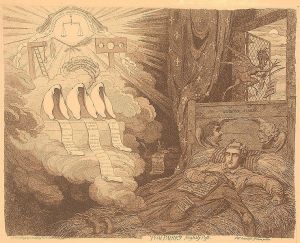
Tom Paine’s Nightmare by James Gillray, 1756-1815, artist.
Ongoing dreamwork and consistent intuitive meditation will acquaint you with not only the dreamwork symbols archetypes we share in common as humans but will also reveal the personal vocabulary used by your unconscious mind to communicate with your waking mind. You will find certain symbols being used over and over again in a way that is unique to you. This vocabulary seems to draw on each person’s own life experiences, culture and language. For example, in waking life I have lived in Japan, Taiwan and many places in the United States. I also traveled to China and the Middle East. It was natural that I had many dreams about being in these countries or traveling to them. However, after a while, I realized that my dreaming mind presented countries overseas as symbols for the foreign and unknown parts of my own inner psyche.
Therefore my dreams presented Asia and anything connected to Asia, such as the Chinese language or a Japanese teacher, as expressions for the unconscious. Along these lines, Chinese characters in my dreams came to symbolize intuitive messages that needed deciphering.
Traveling in Familiar and Strange Places
Because I had lived for so long in Japan and was familiar with the language and culture, Japan came to represent a new place within myself I could travel with relative ease, a place inside myself where growth wasn’t so difficult because I was already somewhat familiar with the territory. Using this analogy, a very common theme in my dreams has been trying to find my way around Tokyo, something that in waking life wasn’t difficult because I spoke the language and read the signs. So when I had a Tokyo dream, I knew I was entering new but not necessarily challenging emotional and psychological territory.
A place like Thailand was more exotic; and represented stranger, unexplored parts of myself. Because I have only been to the Middle East once and found it very “foreign” and different from anything I personally knew, the Middle East represented an even stranger place inside myself, where things began to get scary. Since I have not been to the jungles of Africa, they came to represent some of the most unknown and mysterious parts of my deepest self—places that were so totally foreign and scary I had almost no known associations with which to get a handle on them. I was quite blind to the situation and my dreams of Africa let me know it.
What is important is to recognize your personal dream themes and symbols of this interior journey you are making that oddly coincide with the outer journey of your life. You will come to know these unique expressions by their repetitive synchronous appearances in your inner or outer life.


By: frankramer,
on 4/29/2014
Blog:
(
Login to Add to MyJacketFlap)
JacketFlap tags:
dreamwork,
dream journaling,
On Dreams,
Dreamwork Methods,
dream healing,
keeping a dream journal,
dreams,
Uncategorized,
dream,
Edgar Cayce,
Add a tag

Landscape with the Dream of Jacob by Michael Lukas Leopold Willmann
Dreams are a great way of connecting to one’s own inner wisdom. Edgar Cayce thought it was so important to remember dreams as part of an overall plan to stay healthy in mind, body and spirit that in Reading 5754-3 he says failure to remember dreams “…Indicates a very negligible personage!”
Remembering dreams is a great challenge for many people. I have come across numerous suggestions on how to improve dream recall but here is what I found works well for me and people I know:
- On a daily basis, especially before going to bed, tell yourself that dreams are valuable and you want to remember them. If you are so inclined, even say a prayer requesting help in remembering dreams. These practices will offset any negative input you’ve experienced that suggested dreams are not important. It will also break you of the habit of ignoring dreams. The more you do this, the more you will remember your dreams because you are reprogramming your mind to work better on your behalf while enlisting the powers of higher consciousness and spiritual beings to help you do it!
- Join a dream class. Just by doing this, many of my students reported that taking the class prompts them to remember their dreams.
- Keep a dream journal (digital app or old fashioned notebook) next to your bed to record your dreams. Seeing a notebook there will prompt you to ask to remember your dreams.
- While half asleep, before you move a muscle or before you are fully awake:
- Review the dream as if it were a movie you saw the night before. Make sure you note the action, plot, story, characters, colors, feelings and important symbols. This is perhaps the most important point if you already remember dreams but want to get better at the practice. After a while doing this, you will find the practice not difficult and often pleasurable, as if you are watching a TV show while you are half asleep on the couch.
- Give the dream a title that has a strong association with the dream. For example, you dream that you are walking into a room filled with red roses. Call it something graphic like The Room Filled With Red Roses.
- Review the dream once more to let it sink in, again connecting your title to the dream. At this stage an experienced dreamer can fall back to sleep, knowing he or she will most likely remember the dream upon rising or later in the day.
- Write down the dream in the dream journal soon after rising from bed.


By: frankramer,
on 4/24/2014
Blog:
(
Login to Add to MyJacketFlap)
JacketFlap tags:
dreams,
Uncategorized,
intuition,
Religion and Spirituality,
intuitive heart,
Henry Reed,
energy healing,
Edgar Cayce,
characteristics of intuition,
faith healing,
dreamwork,
dream journaling,
Dreamwork Methods,
Meditation Methods,
imagination,
Add a tag
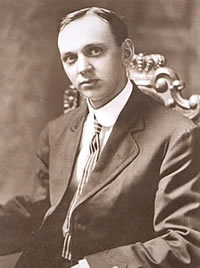
Edgar Cayce circa 1910
Edgar Cayce is considered by many to be the father of holistic medicine. This course will explore how Edgar Cayce intuitively diagnosed and healed, viewed dreams and intuition and show how his tradition continues today in the methods developed by the Edgar Cayce Institute for Intuitive Studies.
Sponsored by the Osher Life Lifelong Learning Institute, Univ. of Hawaii
Instructor: Fran Kramer, Intuitive Heart™ Trainer, certified by the Edgar Cayce Institute for Intuitive Studies. (2011)
Dates: June 12, 19 and 26, 2014
Time: 10:30 AM to Noon
Place: Honolulu, Hawaii. For specifics, inquire on registration.
To register call:
Rebecca Goodman, Director
Phone: (808) 956-8224
Email: [email protected]


By: frankramer,
on 4/15/2014
Blog:
(
Login to Add to MyJacketFlap)
JacketFlap tags:
dream journal,
recording dreams,
dreamwork,
dream journaling,
On Dreams,
Dreamwork Methods,
keeping records of dreams,
journal,
dreams,
Uncategorized,
dream,
Add a tag

Keeping a Dream Journal
If you are serious about developing a deep connection with your inner self, this task is perhaps the best practice you can do. Keeping a dream journal involves writing down your dreams as they occur. Ideally, this would be just as you are waking up while the dream is still fresh in your mind. So keep a notebook and a pen (or digital diary–there are apps for that now if you can get technical while half awake!) next to your bed. If you are one of those people who can’t seem to remember your dreams, then try keeping a journal of whatever comes to mind that is important to you on a daily basis. For any kind of journaling, keep it simple. That will be the best assurance for encouraging you to be faithful about making regular entries into it. At a minimum each entry in a dream journal should include:
- The date
- A title for the dream (this will help you remember the dream as you remember a movie)
- A detailed description of the dream written in the present tense. Include every color, character, object, background, place, emotional feeling, and emotional nuance. Pay attention to the number of things occurring such as recording if there are 3 books or 2 people. It is important. Find and use a good dream dictionary—one that gives many meanings to each symbol and teaches dreamwork exercises. I like Cloud Nine: A Dreamer’s Dictionary by Sandra A. Thompson.
This practice will usually be all you have time to do on a regular basis. However, depending upon how thorough you want to be, you can do the following:
- Reserve a section either below or next to the dream where you make a note of any dreamwork done on the dream such as making associations with the dream symbols or make notes on what the dream may be about by using the other dream methods described below.
- If you have asked to have this dream prior to dreaming it, you should by all means write down the question or intention before having the dream. The point isn’t to be so thorough in analyzing every dream but to keep an ongoing consistent recording of every important dream and even the minor ones, if you have the self-discipline. You can always come back later and do additional dreamwork on any dream if you have done a good job of recording the dream in detail.
- If you have seen how this dream has helped, you may want to reserve space to add a note about this in the margin or in a space below the dreamwork section.
Also, what appears to be a minor dream to your waking mind can actually end up being of profound importance for the rest of your life, so please pay attention to the very short dreams and ones that don’t seem important. It might not be apparent at the moment, but you will see the dream’s significance in ten or twenty years down the road. You will see that your deeper consciousness is already preparing you for the major tasks that lie years ahead. Also you will want to record dream encounters with healers and guides whose presence you might want to honor later


We all dream every night but few of us actually try to remember, much less record, these messages from the Unconscious. Some people may jot down important dreams or keep a dream journal for a few months. A very small percentage of people, I among them, have made a lifetime habit of recording on a daily basis almost every dream remembered, resulting in a collection of dreams numbering in the thousands. What can be seen from reading and reflecting on all these dreams?
Many Dreams are Prophetic
As I read the dreams in chronological order as I would a novel, I see that a large percentage of the dreams are either telling me something about my current situation or are prophetic messages of something happening in the future. The dreams that relate to the present usually offer some sort of insight such as clarifying feelings I have or indicating a process I am going through. The ones that relate to future usually are a bit hard to understand in my current situation so I have learned to take them to be indicators of something that may happen later in a different situation. For example over ten years ago I had many dreams occurring over several months that had me living in Hawaii—at a time when I did not even consider making my home there. Three years later, I ended up moving to Hawaii. Because of experiences like this, I believe that déjà vu is often the remembrance of place, events and people we have already seen in dreamtime. Seeing this congruence between dreams and the future gives one a tremendous sense of awe at the power of the Unconscious to connect us to the future.
The Real Power of Dreams
In dreamtime, setting the stage for the future we may walk into and the making choices among several presented to us, is an important awareness that puts the conscious dreamer at a great advantage. I believe, after a lifetime of seeing this process take place, that we all live our lives twice— like the James Bond movie says—once in our dreams and once in our lives. In dreamtime we are already negotiating the future. Edgar Cayce noted that dreams are the answers to tomorrow’s questions. In dreamtime, we make the choices, experience the transformations, and meet the people we will meet later. If we tune into our dreams and become aware of the process, we can be prepared with foreknowledge to face the future. We will know that we can get through that awful transition or survive a breakup of a marriage because we will have already experienced and remembered doing it in dreamtime. However, the real power of dreams is not that they can predict the future. The real power lies in knowing we don’t have to make the decisions we made in dreamtime. If we weren’t happy with the decision we made in dreamtime, we can make a different decision in waking life. We have a second chance. But that only happens if we remember the dream. Otherwise, we are like computers playing out a code that has already been programmed—and live with the consequences.
Sustained by a Greater Power
Years of recorded dreams will show times when guides and healers appeared in periods of crisis to sustain and support the dreamer. These figures bring insights and healing power that far exceed the abilities of the waking mind. Once these helpers are recognized for what they are, they can be accessed and employed for intentional purposes of the dreamer, again making the dreamer realize we are in the hands of loving and profoundly powerful forces that are ready to help us. And in dreams we can even see their faces!


By: frankramer,
on 2/11/2014
Blog:
(
Login to Add to MyJacketFlap)
JacketFlap tags:
Ashlynn Acosta,
Dead Men Do Tell Tales,
dream coach,
Dream Helper Ceremony,
dreams,
coach,
dream work,
intention,
dreamwork,
Intuitive insights,
Maeve Merton,
tasks of a dream coach,
working with dreams,
mentor,
dream talent,
dream journaling,
dream mentor,
Add a tag

Ashlynn Acosta with her Dream Mentor, Maeve Merton
A dream mentor is very much like a midwife, but instead of helping the mother birth a new person into the world, the dream mentor supports the dreamer who is like a mother birthing of a new consciousness into awareness and action. Dreamwork, when done with the help of an experienced mentor, is an intentional exercise used to facilitate the process, much like a midwife would instruct the laboring woman to breath or sit in a position that will help the birthing process along.
A dream is a symbol for a new awareness waiting to take on life, and it is the role of the mentor to not create the new awareness but just to help it along. Dream mentoring is basically a helping and facilitating role, not a directing role. It is guided by nature’s way of bringing new awareness into our waking world.
Towards this end a good dream mentor will prepare the dreamer to give birth to new consciousness by coaching the dreamer:
- To record and remember dreams. For many people, just making the intention to do these two things is a major step in a new direction and often prompts the dreamer to remember his or her dreams. Following through on the choice alone quite often helps people to become more aware of their dreams.
- To work with dreams through various kinds of processes such as association, storytelling, improvisation, and re-enactment.
- To proactively seek solutions for problems and concerns through dream incubation and lucid dreaming. Instead of just waiting for an answer from a dream, the dreamer can request a specific answer from a dream by asking to have a dream that will provide the answer. Writing the dream down and making the intention the night before helps a great deal to get a good result.
- To work in a dream group whereby members can help each other with their dreams or can dream for each other such as is done in Henry Reed’s Dream Helper Ceremony.
For an example of how a dream mentor works, please read or have your children read Dead Men Do Tell Tales, a teen mystery novel. In the story thirteen-year-old Ashlynn Acosta learns how to work with dreams from a dream mentor, Maeve Merton. With this assistance she learns to turn nightmares into problem solving tools, heals grief and helps save a friend suspected of a murder. She has learned skills that will help her for life and set her above her peers in accessing an important inner resource that can be relied upon in time of crisis.





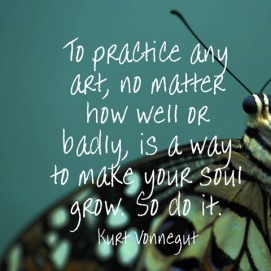













Excellent reflection…..now I understand my deja vu experiences….